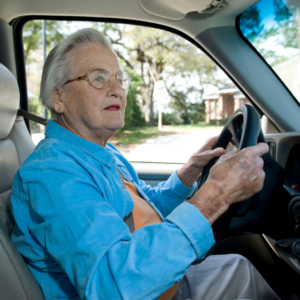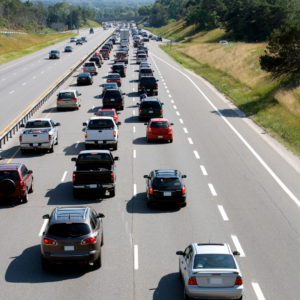Does Driving Slow Cause More Car Accidents?
When an accident occurs, we often think of aggressive drivers or motorists traveling at excessive speeds. But what many don’t realize is that slow drivers can also cause car accidents by disrupting the flow of traffic.
If high or slow speeds were the cause of your motor vehicle accident, Munley Law can help you through the legal process.
Why Slow Driving Can Be Dangerous
 Pennsylvania law, mandates that drivers adhere to posted speed limits. The state’s minimum speed limit regulations require motorists to maintain speeds that do not impede the “normal and reasonable movement of traffic.” Nevertheless, reduced speeds are permissible when safety is a concern.
Pennsylvania law, mandates that drivers adhere to posted speed limits. The state’s minimum speed limit regulations require motorists to maintain speeds that do not impede the “normal and reasonable movement of traffic.” Nevertheless, reduced speeds are permissible when safety is a concern.
On single-lane roadways where passing is impossible, slow-moving vehicles are required to pull over to the brim or shoulder to allow others to pass.
With these regulations in place, drivers must understand that safety is a concern when slow drivers are on the roadways, especially on single-lane or congested highways.
Slow driving can be dangerous for several reasons, including:
- Disrupting the traffic flow: On two-lane highways, the left and right lanes travel in the same direction. But when a driver traveling at slower speeds than posted is in the left lane, it can cause traffic jams as it is more dangerous to pass on the right than on the left.
- Traffic congestion: Slow-driving accidents are likely to occur when drivers are moving at reduced speeds in congested traffic areas. This can cause dangerous situations, especially if a distracted driver is behind the slow driver. Should the slow driver brake suddenly, a rear-end collision can occur.
- Roadway confusion: A driver moving slowly can cause confusion to another motorist. They may think a hazardous situation is ahead, causing them to move slower, even if no condition exists. This confusion can also lead to aggressive driving by other drivers who become frustrated with the slow driver.
Though less common than speeding accidents, slow-speed accidents can cause severe injuries and even traffic fatalities. If you encounter a slow driver, making informed decisions regarding traffic laws and how to bypass the motorist safely is critical.
Who Is Likely to Engage in Slow Driving
 We’ve all done it—we see an elderly driver on the roadway and try to move away from them as soon as possible because we expect them to drive below the speed limit. There is some truth in this assumption, as some demographics are more likely to be slower drivers.
We’ve all done it—we see an elderly driver on the roadway and try to move away from them as soon as possible because we expect them to drive below the speed limit. There is some truth in this assumption, as some demographics are more likely to be slower drivers.
In general, the most common slow-moving drivers are:
- The elderly: Many older drivers think that driving slowly makes them the safest, but the reality isn’t. They may drive slowly to help with their reaction time, compensate for poor vision, etc.
- New drivers: Inexperienced drivers are also more likely to engage in slow driving behavior out of an overabundance of caution.
- Tourists and rubber-necking: If your commute includes a tourist area or is a common site for car accidents, you’re more likely to see slow drivers who are rubber-necking and slowing down to see the views.
- Distracted drivers: Though distracted driving is negligent behavior, drivers using their cellphones, eating and drinking, or changing radio stations are more likely to travel at reduced speeds.
If you see a driver moving slowly and causing hazardous road conditions, don’t be afraid to alert law enforcement officers, as the driver may need assistance or a reminder to drive safely.
When It Is Allowable to Drive Slower than the Speed Limit
 Drivers should travel the roadways at the posted speed limits for the safe operation of a motor vehicle. However, there are situations where traveling at a reduced, reasonable speed is acceptable.
Drivers should travel the roadways at the posted speed limits for the safe operation of a motor vehicle. However, there are situations where traveling at a reduced, reasonable speed is acceptable.
If you are involved in a slow-speed car accident and were driving at a reduced speed, you will need to prove to the insurance companies that you had to drive at a reduced speed for safety reasons.
Heavy traffic
Traveling at reduced speeds can be in your best interest if you encounter heavy traffic. This may be at rush hour traffic at busy intersections, in a construction zone, etc. However, you should maintain the constant speed of those around you to avoid causing more disruption.
Inclement weather conditions
In poor weather, driving at less than the average speed is recommended. This can be in snow, ice, rain, or sleet with poor vision and slick road conditions. However, if you are an inexperienced driver in these conditions, it may be safer to get off the roadways until the weather improves or roads have been treated, but only if you can get to a safe location away from potential hazards.
School Zones
School zones have safe speed limits posted to keep children and other pedestrians safe. Traveling at these slower speeds is essential and a legal requirement in these areas.
Speeding Is More Likely to Cause Car Accidents
The National Safety Council reports that in 2022, speeding drivers were responsible for 29 percent of all traffic fatalities. Though slow driving is dangerous, speeding still remains one of the most common forms of reckless driving.
Drivers traveling at unsafe speeds are more likely to experience a reduced reaction time to other motorists and hazards, require longer stopping times, which can be problematic if a driver in front engages sudden braking, and reduce the effectiveness of protection equipment inside the vehicle in the event of a speed-related accident.
Speed-Related Car Accidents: Contact Munley Law
Following the traffic speed isn’t a suggestion—it’s the law. If you or a loved one were involved in a speed-related crash, the car accident attorneys of Munley Law are here for you. Slow drivers can be just as dangerous as fast drivers, and when their negligence causes serious injuries, you need a personal injury lawyer you can count on.
For 65 years, Munley Law has helped accident victims recover compensation for medical bills, lost wages, property damage, and more. With a track record in securing multi-million dollar settlements and verdicts, Munley Law has become the personal injury claims law firm families trust.
If you suffered injury or lost a loved one to fatal injuries, call Munley Law today for a no-obligation, free consultation.

Marion Munley
Marion Munley is recognized for her compassionate representation of catastrophically injured clients and her steadfast dedication to them and their families. Her advocacy has produced numerous multimillion-dollar recoveries, including one of the largest trucking accident settlements on record. Marion is Triple Board Certified by the National Board of Trial Advocacy in Civil Trial, Civil Practice, and Truck Law, and since 2023 has been named one of Pennsylvania’s Top 10 Super Lawyers by Super Lawyers.
Posted in Car Accidents.
Tagged Insurance Negligence









